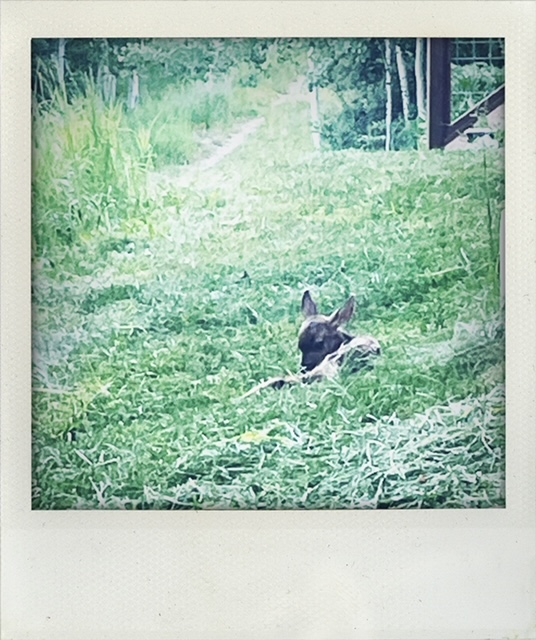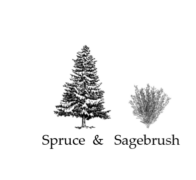To say it’s green everywhere is to simplify the shades of sage and lime, forest and moss that surround my trail. It is as warm as it gets at 9,000 feet, and there are no signs of yellow leaves. The only gold hues are the ragwort blooming in abundance alongside blue flax and orange paintbrush. The young aspen shoots and grasses that line the trail are hip height and the trees are full of new growth. It hasn’t rained for a month, but a snowy winter and a rainy spring have made it lush everywhere with now worry of wildfire.
Hiking to work, just in front of my neighbor’s porch, I come across a newborn fawn, still wet from the mother licking off the scented afterbirth, so it was probably born that morning. Deer like to give birth in grassy meadow-type places, and sometimes it’s a backyard. In these first few days, the mother–a doe I have seen before on this trail–will be back several times a day to nurse the weak fawn. I like to think most people know to leave them alone, but some visitors don’t. Just the week before a friend told me a man showed up at his work carrying a baby elk, unaware that in trying to “help” what he believed to be an abandoned baby, he likely endangered it further. It is a myth that a doe will abandon a fawn if humans touch it, but when humans touch it, they stress the baby and leave people smell behind, making the largely scentless baby more vulnerable to predators.
“Oh, this happens all the time,” my friend said. “One time a woman brought in a baby coyote she pulled out from under her porch because she was sure it was abandoned. They mean well, they just don’t know any better. They just want to help.”
Admittedly I, too, feel drawn to the newborn baby, but I know its mother is nearby and it is fine. I take one quick picture, see the fawn start to look anxious, feel bad about that, and move on down the trail, knowing that I have no role here. As I walk I think about the complexity of help; how it contains within it both service and superiority. I remember a buddy’s story about how her 96-year-old friend bought her book called “Dinner for Two” as a Christmas gift. The pair, who have an almost 50-year age difference, have had a standing weekly dinner date for nearly a decade. With the book, the elder friend wanted to alternate weeks cooking for each other. The recipes aren’t difficult, but the woman in her 90s has many physical limitations. She can’t stand for too long, she is on oxygen, has arthritis, and she struggles to walk. But she is sharp as a tack and has the iron toughness of the German immigrant she is and can probably will the dinners into existence if that is what it takes.
“She was so excited about the idea,” my friend told me. “She wants us to sign and date each time we make a meal. I think it’s a great idea, but it was kind of hard to watch. She really struggles to pull it off. I just kept thinking, ‘you don’t have to do this.’ ”
The image of a woman almost 100 years old fighting all those challenges to make a dinner she can barely chew has me locked up and wanting to look away. It throws me back to watching my kids struggle with tying their shoes or learning to write. The difference, of course, is that for children those things are new. But this woman in her 90s knows how to cook and how to stand and how to walk. She, instead, is learning to do those things with the body she has now, and that is hard; much harder for her to do than for my friend to watch.
The push and pull of past and future is ever colliding in moments of effort. What is difficult and what is easy is always changing as is our audience for the struggle of the moment. I try to remember this as my husband starts to throw his new phone across the room or as I am tempted to call for a ride home on Friday instead of hiking the two miles uphill, or as my kids wail about tax forms and memorizing their social security numbers.
As a Midwesterner, I am culturally overly helpful, but I didn’t realize this until I moved West and got some perspective on it. Now you can just search the Internet for “Midwestern Nice” and can laugh at my expense. I am in recovery, so I try to wait for someone to ask, indicating they actually want my help. But I fall off the wagon now and then, and next thing I know I am jumping up off the couch with a “let me get that for you.” There are a few problems with unsolicited help: It might be unwanted, it can be hard to refuse, it can send a message that the person you are helping can’t do the task themselves and it can distract you from focusing on your own life.
I hit bottom with my helping addiction when my kids were in elementary school. I was working full-time, helping remodel my home and volunteering for at least three community organizations. I could not stop myself, it seemed, from raising my hand to bake something, buy something, sell something, govern something, plan something or help build something. I descended into exhaustion, and it became harder and harder to plaster that sweet smile on my face. I felt like a coffee shop barista at 7 am with a line that never got shorter. It was my husband who first called me out.
“Why don’t you just stop?” he asked, so simply, so smugly, as if it were that easy.
Of course that is what every addict hears: Why don’t you just stop: drinking, smoking, using, eating, gambling, shopping, listing words, belaboring the point.
I glared at him. The nerve. With all that I was doing, if I stopped the world would … keep on spinning and not miss a beat. My essentialism was all in my head and was ruining my life. So I started quitting, and with each refusal, saying no got easier because I felt energized, like I had space to breathe. It took about five years to disentangle myself from my commitments, but I officially ended my last volunteer task five years ago.
The new space allowed me to slowly return to myself. Planning my day not around what other people needed but what I wanted to do. I started reading more, hiking more, and feeling exhausted much less. My life became uncluttered and then curated, with a newly developed “I’m sorry I can’t” muscle that helped me choose obligations consciously so I enjoyed them fully.
With my oldest child past the half-way point of college and my youngest child graduating in months, they need so little help these days. I feel that I have learned a great deal from my recovery. I no longer help others unless I am asked, and I respect people’s right to struggle. If I help it is because it’s natural and healthy, not as a way to avoid investing in my own life. I have a good balance, I tell myself. But there is so much need in the world, I tell myself. Maybe it’s time to volunteer again, I tell myself. I can help, I tell myself. Just a little bit.

